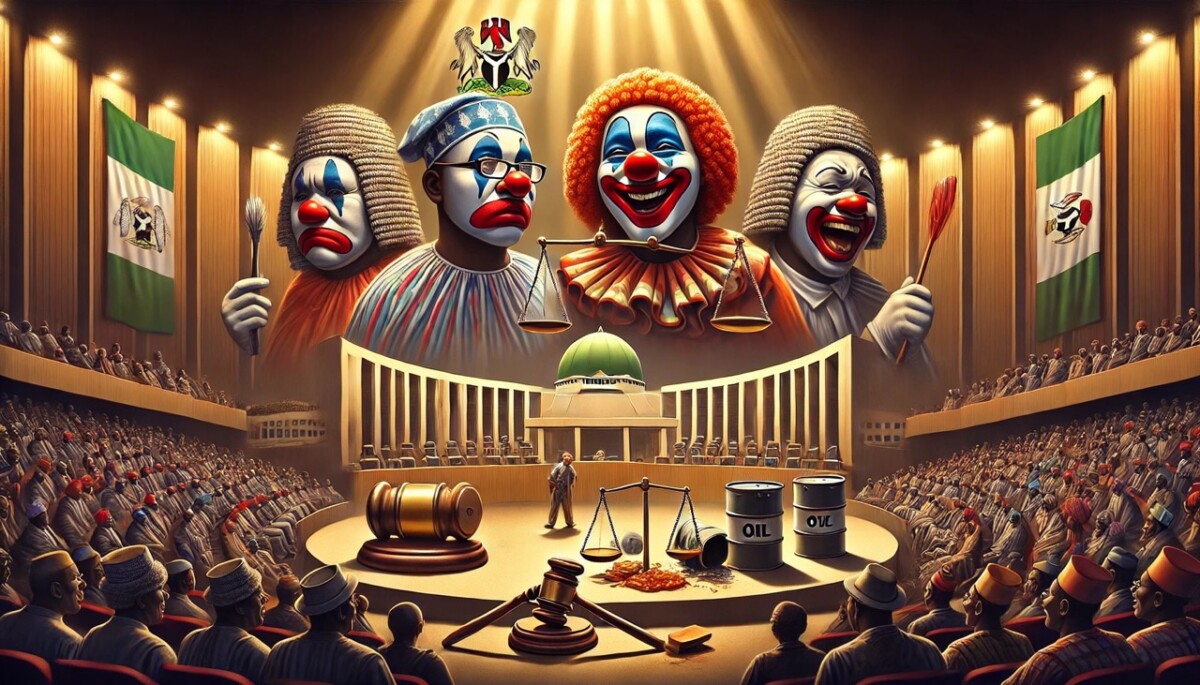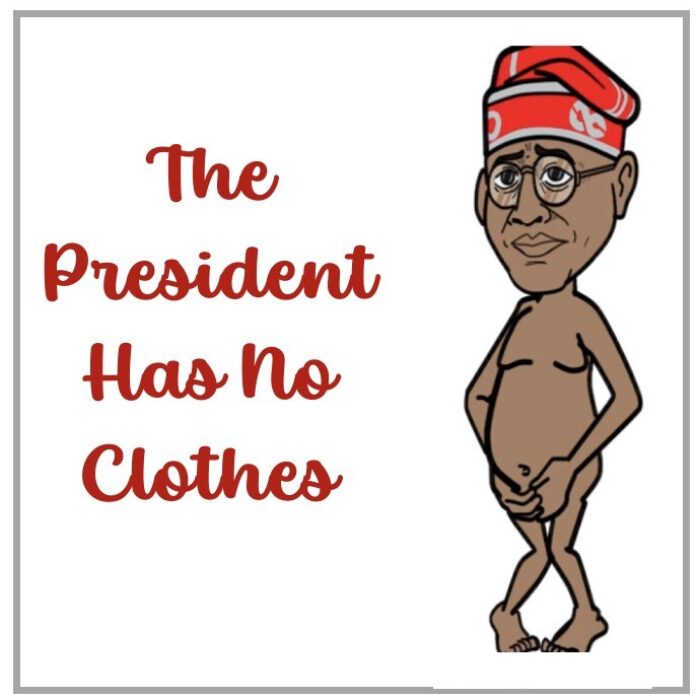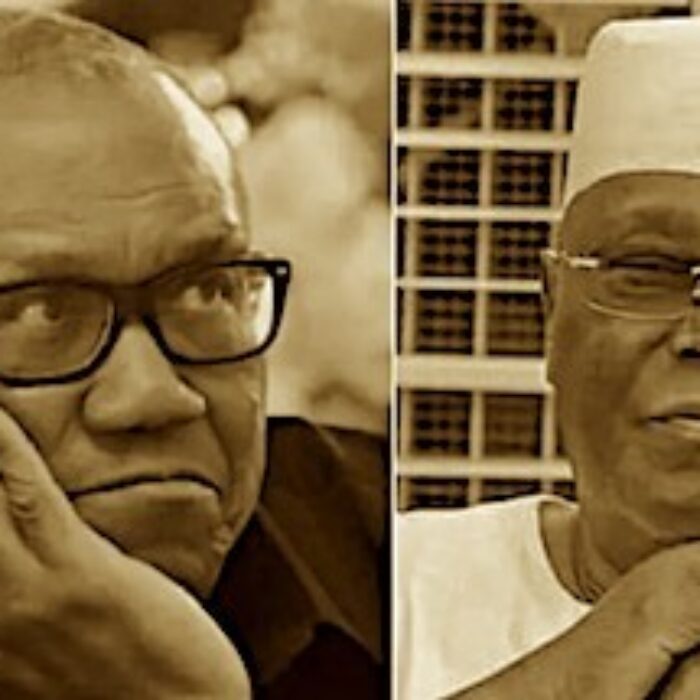The Editorial Board
Nigeria, once heralded as the “Giant of Africa,” has tragically devolved into a theater for the most absurd and grotesque comedy of governance in modern history.
Leading this dismal circus is the president, the chief of the comedy troupe, a man whose visionless and inept leadership embodies the betrayal of a nation trapped in a tragicomic cycle of errors, misrule, and squandered potential.
Flanking him is the Senate president, a conceited and vainglorious ringmaster skilled only in choreographing applause for failure, and a horde of ministers and cabinet members playing the roles of bumbling clowns.
Together, they stage a grim performance of incompetence, arrogance, reckless mismanagement, and abject leadership failure, plunging the nation further into a nightmare of despair and devastation.
Yet, the tragedy is not theirs alone. The Nigerian people, once vibrant and full of promise, have become complicit in this farce. Many have resigned themselves to being mere spectators in this theater of chaos, silently enduring the hardship and misery inflicted upon them.
Like zombies, the majority of the people shuffle through the motions of daily life, numbed by years of unfulfilled promises and crushed dreams, their collective spirit eroded by despair. Their silence, whether born of fear, apathy, or exhaustion, becomes an unspoken endorsement of the very system that perpetuates their suffering, allowing the cycle of failure and exploitation to continue unchecked.
Worse still, a significant portion cheer on the clowns, mindlessly singing their praises and defending their failures. These useful idiots, oblivious to the damage being done, serve as enablers of the circus, giving legitimacy to a leadership that thrives on mediocrity and systemic corruption.
This combination of clueless leadership and a passive, even complicit populace has driven our nation spiraling toward collapse, where the show goes on—not as a source of entertainment, but as a slow and painful destruction of a once-great nation.
The Chief Of The Comedy Troupe: The President
The president is the undisputed star of this circus—a maestro of bungling theatrics who commands the stage not with wisdom or vision, but with the sheer audacity of his cluelessness. His economic policies are as erratic as his public pronouncements, veering from one ill-conceived idea to the next, leaving citizens in a perpetual state of confusion and despair.
His crowning “achievement” in this nightmare has been jetting around the globe in a relentless quest for loans, recklessly collateralizing the nation’s oil reserves. In doing so, he has succeeded in saddling Nigeria with a crippling debt burden—one so colossal that generations to come will struggle to repay it.
Under his leadership, inflation has skyrocketed to dizzying heights, reducing purchasing power to mere pocket change. The economy is a sinking ship, but he confidently declares, “We’re on course!” even as millions drown in poverty and die of starvation. His arrogance is matched only by his detachment from reality.
While hunger grips the land, he chuckles at high table banquets, surrounded by the wealthy elite who cheer his every misstep. To him and his fellow elites the clown show goes on as long as the gravy train keeps flowing and they revel in their ill-gotten gains, indifferent to the crumbling state of the nation. For them, governance is merely a stage to amass wealth and power, while the people bear the brunt of their greed and ineptitude.
The Ringmaster: The Senate President
The Senate president plays the role of the ringmaster, cracking the whip to keep the circus running smoothly—for the benefit of the performers, not the audience. Inept and error-prone, he is a master of empty theatrics, more concerned with orchestrating applause for the chief clown than addressing the cries of the people.
Instead of passing meaningful legislation to tackle inflation, unemployment, hunger, insecurity, systemic corruption or improve power supply and infrastructure, he spends his days rubber-stamping every ill-conceived policy that crosses his desk.
His speeches, laced with arrogance and self-congratulation, ring hollow in the ears of citizens who struggle to afford even a loaf of bread. He is the perfect enabler of chaos, a man whose allegiance lies firmly with the circus, not the nation. Yet, despite his glaring shortcomings, he harbors an unbridled ambition to ascend to the presidency in the near future.
The Circus Clown #1: Minister Of The FCT
The Minister of the Federal Capital Territory (FCT) is a tragicomic spectacle unto himself—a man who at all times of the day appears to be inebriated, as though he wandered straight from a bar into the corridors of power. He reminds you of that drunken uncle at Christmas, the one who picks fights with everyone, and passes out on the couch snoring heavily. Except in this case, the drunken uncle is in charge of managing the capital of an entire nation.
Erratic, confused, and perpetually thuggish, he oscillates between fits of anger, bouts of vengefulness, and moments of sheer incoherence. His mood swings are as unpredictable as the nation’s electricity supply, making it clear that emotional maturity and the thought process of a leader are far beyond his grasp.
Power drunk more often than not, he takes reckless actions with no thought for their consequences, driven more by ego than by strategy. His idea of leadership seems to be shouting orders and intimidating subordinates, hoping that chaos will somehow yield progress.
His glaring lack of professionalism is evident in every aspect of his role. Instead of implementing well-thought-out policies to address Abuja’s crumbling infrastructure, he spends his time pursuing vendettas, making knee-jerk decisions, and fueling controversies.
Productivity is an alien concept to him; his tenure is a series of unfulfilled promises, half-baked ideas, and embarrassingly public blunders. He is a walking, quacking embodiment of incompetence, the very definition of mediocrity.
And why is he in this critical role? Certainly not because of merit. No, he occupies this position as a political reward for helping “deliver” his state to the president during the last election. Meritocracy had no seat at this table—it was unceremoniously booted out in favor of cronyism and political treachery. His entire presence is a stark reminder that leadership in Nigeria is often not about ability but about who owes whom a favor.
His leadership style is a parody of governance. When challenged, he resorts to thuggish tactics or flippant remarks, unable to provide solutions. His public appearances are exercises in cringe-worthy antics, as he stumbles through speeches, sometimes literally, leaving the public bewildered.
Abuja, the nation’s capital, reflects the state of his leader: disorganized, broken, and deeply dysfunctional. And as he waddles through his tenure, quacking platitudes and blaming everyone but himself, Nigerians are left to wonder how much longer the circus of his incompetence will continue.
The Circus Clown #2: Minister Of Finance
The Minister of Finance is another tragicomic figure, a man entrusted with managing the nation’s finances and economy yet woefully unequipped to do so. His economic policies resemble a blindfolded juggler throwing knives in a crowded room—reckless, dangerous, and inevitably disastrous. Instead of stabilizing the economy, he has presided over its complete unraveling, leaving Nigerians to bear the brunt of his ill-conceived strategies.
His hasty removal of the fuel subsidy, coupled with the rapid devaluation of the Naira and the unchecked printing of currency, has unleashed a storm of inflation that has devastated an already fragile economy. Prices of basic necessities—food, medicine, and transportation—have skyrocketed, pushing millions further into poverty.
Thousands of businesses have fled the hostile economic environment, leaving joblessness and despair in their wake. While the wealthy bask in imported luxuries and insulated comfort, the poor are left scrambling for crumbs in a country where survival has become a daily battle.
Yet, the Minister delivers his economic forecasts with unwavering confidence, as though the suffering of millions is a mere footnote in his spreadsheets. His responses to the unfolding crisis are devoid of empathy or understanding, reflecting an alarming disconnect from the realities faced by ordinary Nigerians.
Policies that should have been carefully planned and phased in were rolled out abruptly, without considering the structural weaknesses of the economy or the lives they would upend.
Under his leadership, Nigeria’s debt has ballooned to unsustainable levels, with oil reserves mortgaged and future generations shackled to a financial burden they had no part in creating. Instead of addressing systemic inefficiencies or corruption, he has chosen the easy route—imposing austerity measures that disproportionately harm the poor while shielding the rich from accountability.
The Minister of Finance is not just incompetent; he is emblematic of a leadership class that prioritizes optics over outcomes, loyalty to the president instead of serving the nation, theory over practicality, and personal gain over the welfare of the people. His policies have not merely failed—they have actively deepened the suffering of Nigerians, turning what could have been a pathway to growth into a road paved with misery.
He has proposed a staggering N47 trillion ($28.18 billion) budget for 2025, with the majority funded through borrowing. This reckless spending, reliant on money Nigeria does not possess, is set to inflate the budget deficit to a staggering N13.8 trillion, pushing the nation further into financial peril.
The State Of The Nation: A Broken Spectacle
Nigeria, under this troupe of dunces, is a tragicomic masterpiece. The economy is in ruins, with systemic corruption bleeding the nation dry. Kidnappers and murderers roam freely, turning safety into a luxury that few can afford. The disparity between the rich and the poor is staggering: a small elite live in unimaginable opulence while the majority languish in abject poverty.
Electricity is a rare miracle, roads are death traps, and education is a shadow of its former self. Food insecurity and hunger are the daily realities for millions, yet the clowns running the show laugh it off as “challenges to overcome.” The audience—Nigeria’s people—are mere spectators in this farce, powerless to influence the performance or change the script.
Perhaps the most heartbreaking aspect of this circus is the state of the spectators. The people have given up, their hope extinguished by years of neglect and incompetence. Once proud and resilient, they now sit silently in the stands, watching the clown show unfold. Their protests are met with brutality, their cries ignored. They have become resigned to their fate, trapped in a nation where the only certainty is the continuation of the circus.
The Show Must Not Go On
Nigeria’s circus of errors is a cautionary tale of what happens when dunces are given the reins of leadership. It is a tragic reminder that leadership without competence, vision, or empathy leads not to progress but to despair. The people may have lost hope, but the stage is still theirs to reclaim. Perhaps one day, they will rise, pull down the tent, and send the clowns packing. Until then, the circus goes on—and the joke is on all Nigerians.




